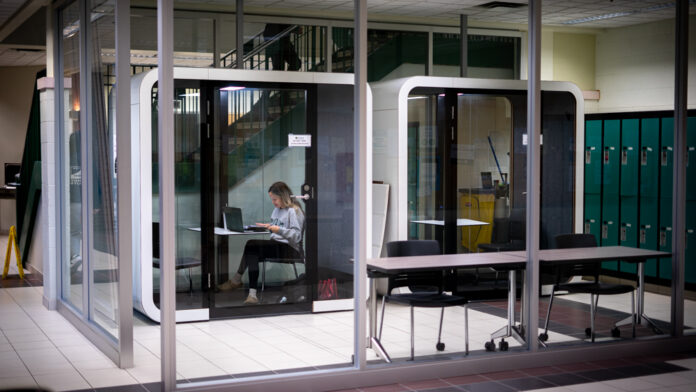

St. Thomas University dean of humanities said the digital media lab on the ground floor of James Dunn Hall will be ready next month after a year of delays.
The project was initially expected to be finished by September of 2022 in order to replace the university’s space at the CBC on Regent Street. After the lease expired on Dec. 31, 2022, students and faculty were left without a collaborative space to develop projects.
Related: STU ends lease at CBC, journalism students disappointed
Related:Disappointment as JDH media lab delays continue
“By mid-October when assignments have to be worked on…that equipment should be available to the students,” said Andre Loiselle, dean of humanities at STU.
Loiselle says they have all the equipment on hand, it’s just the “soft details” that need to be worked out. He said there will be a booking system for all the equipment overseen by the studio manager as well as student employees.
Just steps away from the podcasting booths that were installed last school year, room G-4 will contain the rest of the components including editing suites and a recording studio. This new infrastructure should help classes complete projects on campus and replace the CBC media lab.
Mark Tunney, journalism and communications professor at STU, is looking forward to using the space for his radio and podcasting class next semester.
“I really want a small workspace where we just go to work and work as much as possible,” he said.
Though Tunney is excited about the new space, he hopes that the new lab can create the community of journalists and creators that his classes at CBC had.
“[The CBC lab] created a real sense of community within the journalists,” said Tunney. “Can we create a bit of a community? Can we create a special feel down there?”
Loiselle also envisions the space to be a ‘hub’, much like the community Tunney is hoping for. Both also believe the space should be open to all students regardless of your major.
“We want to start promoting that space as a space that’s open to all students, regardless of their discipline,” said Loiselle.
The lab will also complement the debut of four digital media courses being offered this year. The new interdisciplinary major within the journalism and communications department has been popular amongst students thus far, said Loiselle.
“The students really seem to be quite happy with this new offering … This is the first time they’re being offered and I think that out of the four, three are either full or almost full.”
These courses will give students hands-on opportunities in videography, photography and audio recording. Students will develop these practical skills by having access to necessary pre-existing equipment and software as well as the tools the lab will be offering.
The lab was developed through government funding, but Loiselle is committed to making the space a financial priority.
“It has become a priority that we do want to continue to be able to fund once the government money runs out. There are all sorts of things that are priorities for St. Thomas but the digital media and creative arts has become a priority,” said Loiselle.
Loiselle hopes that investing in the space will make it an attraction for current and future students.
“We have high school students who come here to tour and see what STU is all about and we do want to showcase this.”
